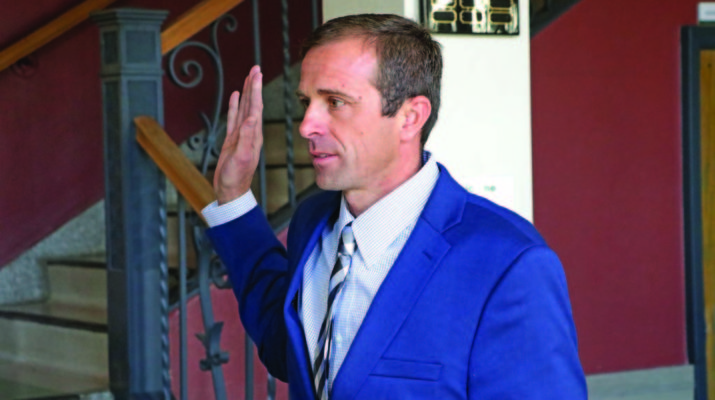At the first Police Citizens Advisory Meeting since he was sworn in, Alliance Police Department Chief Philip Lukens shared his vision for the department’s future, noting his desire for community involvement.
Lukens asked for input from citizens at the meeting to help guide him as the department evolves. He thanked the board members for taking an active role in their community.
“I highly, highly value our citizens’ input into our police department,” said Lukens. “I want to have a dialog with you, I want you to know what we are doing, and I want to get your advice. It’s truly your city, and your input. Your input helps all of us make the best decision for our city.
“You see the city from a perspective, and other people see the city from a perspective” Lukens said. “If we can bring all those perspectives together, it helps us to thwart the number one problem in police right now, all the experts are saying, is trust in police; a lack of public trust.”
Citizens shared their views and concerns, from preparing for the possibility of political or terroristic groups wreaking havoc in Alliance to highlighting positive experiences with officers. After hearing feedback, Lukens revealed some of the projects in motion at the department.
One new program Lukens said will launch soon will be assigning officers to cover different districts in the city, allowing for greater knowledge and interactions with citizens and businesses in those regions.
“The basic idea is that an officer is going to be in charge of that neighborhood, in charge of getting a neighborhood program going, finding block captains, reaching out to people to have routine neighborhood watch meetings, at least once a year,” said Lukens. “Ultimately what our idea is is to give our officers a level of ownership in the community. What they’re going to do is facilitate these meetings, that’s going to bring information back and information out. We need more volunteers. There’s no way the police department can effectively police the community on its own. We’re not even going to try. We want to use everybody in our community.”
Lukens said he plans to have officers visit more local businesses and churches to build relationships with those entities. He said that the department is planning several programs at the schools, including the possibility of launching an explorer program to help build interest in law enforcement as a career.
“If we can mentor them on college, maybe some of them want to become dispatchers before they go on to be police officers, we can work out so many different things for them, and we can keep our kids here that want to be police officers here. It’s invaluable, in my opinion,” Lukens said.
Lukens noted that having people who grew up in the community become officers helps the department because of the knowledge of the community that comes with living in Alliance.
Lukens urged people to volunteer for the Alliance Police Department, noting an opportunity in monitoring traffic.
“One of the things we can do, I just pitched this this morning to Activate Alliance, is get volunteers that will check out a radar,” said Lukens. “They can sit in their front yard, they’re not enforcing traffic or anything like that, but they can get speeds, and write down speeds and license plate numbers, and the police will follow up on it. It’s a nice, low-key way to get our neighbors and each other to be mindful of how fast we’re driving in our neighborhoods to be respectful to each other.
“We’re not looking to go out and write 100 tickets,” Lukens said. “That’s not what we’re trying to do. We’re not looking for volunteers to write tickets. We’re looking for volunteers to help educate our community in a passive way that isn’t so offensive, or standoffish, that says, ‘Hey, when you drive down this street, you may not realize, but you’re always going this fast.’”
Another issue Lukens said he would like to address at the department is equipping officers with cell phones to aid with better communication. Lukens noted that radio service in Alliance was down for a few months, at one period of time, requiring officers to operate off of their personal cell phones.
“We don’t have a system of redundancy for that what if, and we need to be doing that,” said Lukens.
Other goals Lukens discussed at the meeting included offering Community Emergency Response Team (CERT) training, upgrading the radio system to allow for communication with the Nebraska State Patrol, and having officers and dispatchers undergo a certification process to ensure the latest practices in law enforcement are being implemented in Alliance. Lukens emphasized the need for community involvement moving forward to assist the department in providing the best service possible to Alliance.

